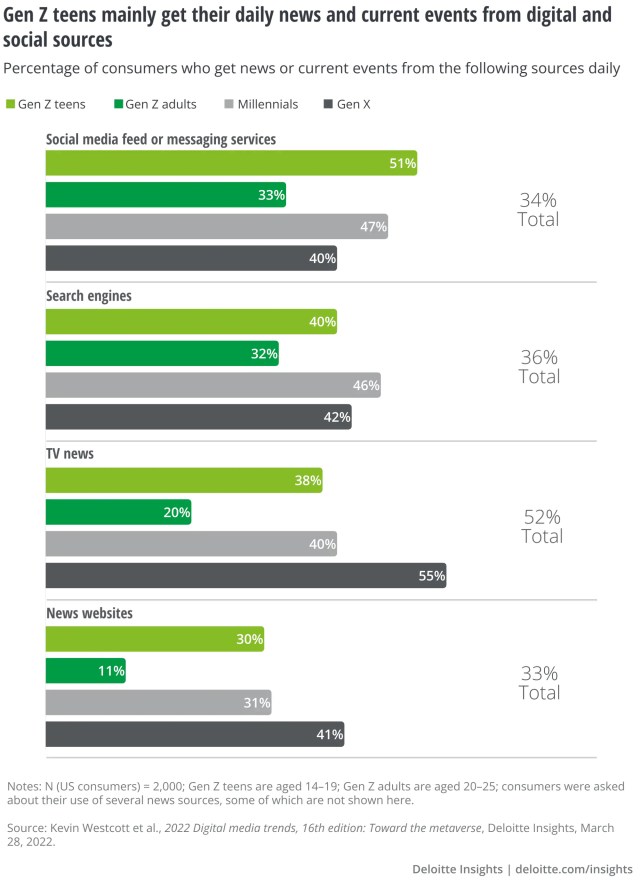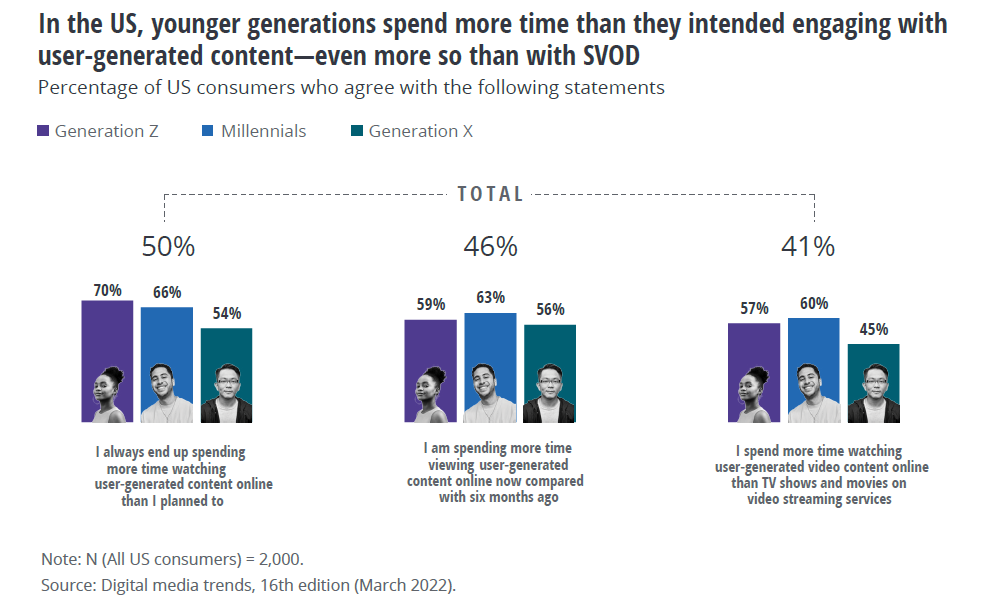
READ MORE: News at their fingertips: Digital and social tech power Gen Z teens’ news consumption (Deloitte)
Gen Z is going to inherit the Earth, so it’s important to understand where they get their information. According to a report from Deloitte, it’s largely on social media consumed on a smartphone, but their habits suggest that they are more concerned about the truth and socially pressing issues than we may give them credit for.

The consultants split out adult Gen Zs aged 20-25 from the teens, aged 14-19, and finds that the younger cohort is consuming more news daily than their older brothers and sisters.
Gen Z teens favor social and digital news formats, with about half of this group saying they get news daily from social media feeds or messaging services and 40% getting news daily from search engines. These sources can offer more immediate, interactive, and engaging news experiences than traditional sources, like TV news or newspapers.

Gen Zs’ engagement with news aligns with research showing young people are concerned about a range of pressing societal issues, including climate change, unemployment, and health care.
Additionally, the terms “news” and “current events” may be more broadly defined for these digital natives who have no memory of a world without smartphones or the internet. News content for this cohort could encompass entertainment, sports, or social justice news (in addition to strictly political news) and reach beyond traditional news sources to include formats like smartphone notifications.
ALSO ON NAB AMPLIFY:
Indeed, mobile devices enable this engagement and serve as a gateway to news and information for young people: per the report, 66% of Gen Z teens who follow news or current events say most of the news they consume is from alerts and notifications on their mobile devices, compared with a slightly smaller share of Gen Z adults.
CHARTING THE GLOBAL MARKETPLACE:
Big content spends, tapping emerging markets, and automated versioning: these are just a few of the strategies OTT companies are turning to in the fight for dominance in the global marketplace. Stay on top of the business trends and learn about the challenges streamers face with these hand-curated articles from the NAB Amplify archives:
- How To Secure the Next Billion+ Subscribers
- Think Globally: SVOD Success Means More Content, Foreign Content and Automated Versioning
- How Does OTT Gain Global Reach? Here’s Where to Start.
- Governments Draw Battlelines To Curb the US Domination of SVOD
- Streaming Content: I Do Not Think You Know What That Word Means
More than half of the Gen Z news consumers (teens and adults) say they consume news on their smartphones exclusively.
Young people are also leveraging UGC formats and visual- and video-focused social media platforms to follow and connect with content creators, who are often sharing news and information about issues they care about.
Nonetheless, 40% of Gen Z teens still watch TV news every day and the average teen consults two different news sources daily, which seems to exhibit a healthy independence of mind.
Deloitte explains this by saying that some teens may be living at home with parents who are more likely to have a pay TV subscription and whose news habits influence them. Conversely, Gen Z adults — who are more likely to be in college, working, and living alone, and also less likely to have a pay TV subscription — and average one news source daily.

“Despite these nuances, Gen Z is highly connected and digitally savvy,” says the report analysts. “The news consumption behaviors of this young cohort present both opportunities and challenges for news organizations and digital platforms alike.”
Deloitte has some advice for news organizations the most obvious of which is that they should do more to involve and engage younger audiences in news processes, especially on social media sites.
Social media platforms should engage Gen Z news consumers in their fact-checking efforts, Deloitte advises. “Young people are already highly engaged on these sites and a majority of Gen Zs consider ‘fake news’ to be a big problem, signaling they may be motivated to get involved.”
Further, investing in what Deloitte call “purpose-driven reporting” can pay off with the younger generation, as many are deeply concerned about issues like climate change, racial injustice, and health care.


